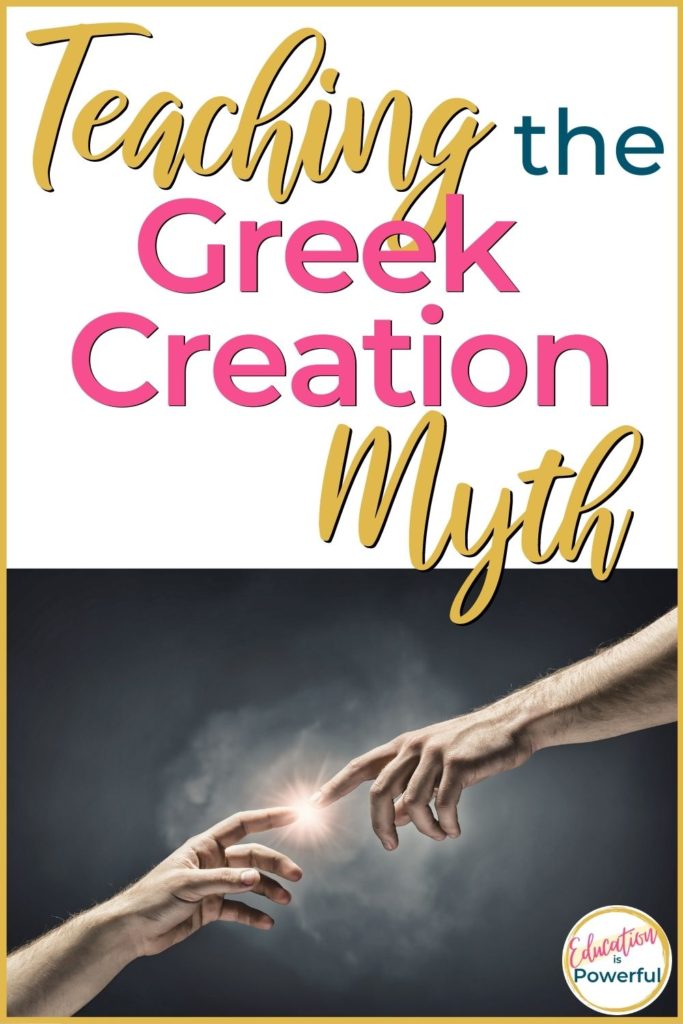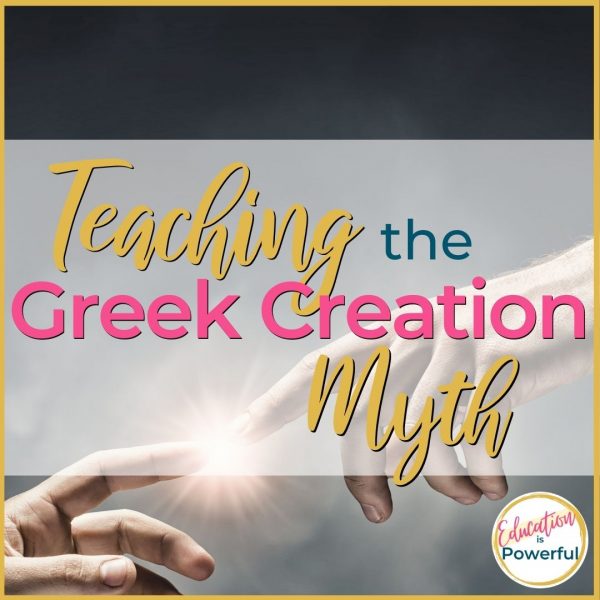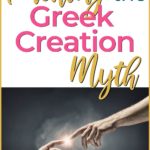The Greek creation myth in many ways is similar to other creation stories – it explains the creation of the earth, plants, animals, and humans. It lays out the role of the gods and the subjugation of humans.
But in many other ways, the Greek creation story is a lesson to us of all the mistakes we don’t want to make. It also teaches us about family – mostly dysfunctional families.
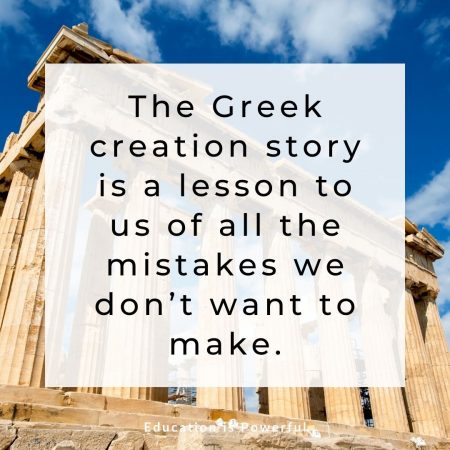
I’m not going to retell the Greek mythology creation story here, but you can listen to my retelling the Greek creation myth in Episode 004 and Episode 005 of my Teaching Mythology Podcast. You can listen to them using the links above or on your favorite podcast listening platform.
Like Father, Like son
Even though the Greek creation myth starts with Gaia – mother earth, it quickly becomes a story all about the boys, and more specifically a creation story all about fathers and sons. The myth moves through the struggle for power and fear of losing that power to your sons by Uranus, Kronos, and Zeus.
Uranus gives birth to powerful beings – the Hecatoncheires and the Cyclops. His fear of their power leads him to lock them in Tartarus – prison for the gods. Who he really should have been afraid of was his youngest Titan son – Kronos. After a lengthy battle and bloodshed, Kronos overthrows Uranus, separating him from the earth for eternity.
As Kronos gains power, he too fears his children. Instead of locking them up in Tartarus, he eats each one. But he doesn’t stop there. He steals powers from his brothers and sisters, the other Titans. That is, until Zeus.
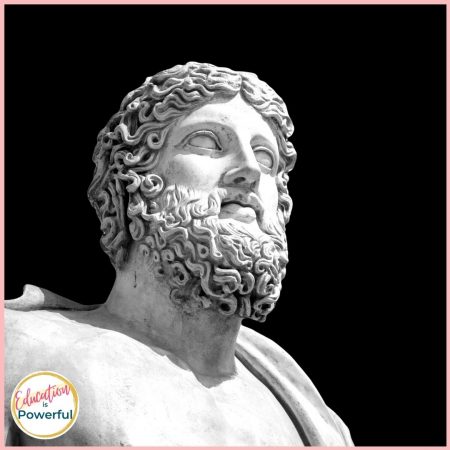
Zeus, who was hidden from Kronos in a trick performed by his mother Rhea, returns to Kronos’s palace to free his Olympian brothers and sisters. By getting Kronos to drink a potion, Kronos throws up all of his children. But to overthrow Kronos, Zeus gets the help in form of the Hecatonchires and Cyclopes by freeing them from Tartarus.
In the end, Zeus imprisons Kronos in Tartarus, as Uranus imprisoned his sons, the Hecatoncheries and Cyclopes.
You would think that Zeus had learned from his father and grandfather, but no. Zeus was fearful of his own child becoming more powerful than him, that he eats Metis (a goddess, prior to marrying Hera, that Zeus loved) while she was pregnant, in order to stop the child from being born.
This child becomes one of the most powerful goddesses in Greek Mythology – Athena. Who, maybe not so coincidentally, never has children.
Do you want to teach the Greek Creation Myth? Download my Greek Mythology Intro PPT today.
I am constantly baffled by the fact that these gods feared their own children. They were so worried about maintaining their own power, that it led to their own downfall.
I wonder what would have happened if instead of being afraid of their children, they would have worked with them. I can’t imagine the immense power the gods would have amassed if they had only worked together as a family, rather than as enemies. We do see a little bit of this among the Olympian Gods. By banding together to work together, they were able to overpower the Titans, the Giants, and any other number of threats.
Gaia - A Fearsome Mother
What adds another element of dysfunctional families is that Gaia was the instigator of the rebellions.
In her own plot for revenge, she encouraged Kronos to rebel against his father. It is said that Gaia made the weapon, a scythe, for Kronos to cut open his father in the great battle.
Gaia also helped Zeus to rebel against Kronos – because Kronos would not release his brothers, the Hecatonchires and Cyclops from Tartarus as he had promised her.
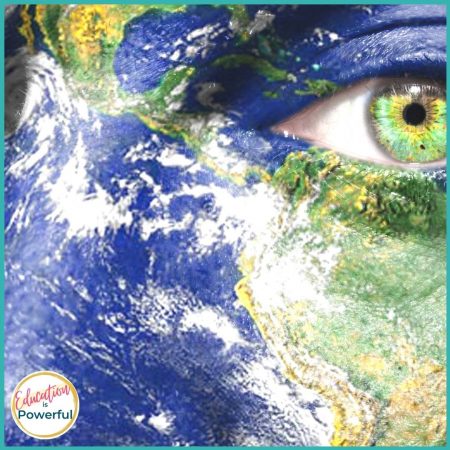
In later myths, Gaia tries to overthrow Zeus with her Giant children. It appears as though she is never satisfied.
On a physical level, I imagine the ancient Greeks picturing her wrath in the form of volcano eruptions. Just like the earth, Gaia gives life and takes it away.
I can’t imagine a mother wanting to harm her own children, but Gaia does. And yet she fiercely defends her children who were monster-like: the Hecatoncheries, Cyclops, and Giants.
According to the Greek Creation Myth, Are We Destined to Repeat the Past?
If there is one takeaway from the Greek Creation myth, it is that the gods continue to repeat the actions of those before them. And for this English teacher, it hearkens to the continual ethnic cleansings that happen and continues to happen throughout the world.
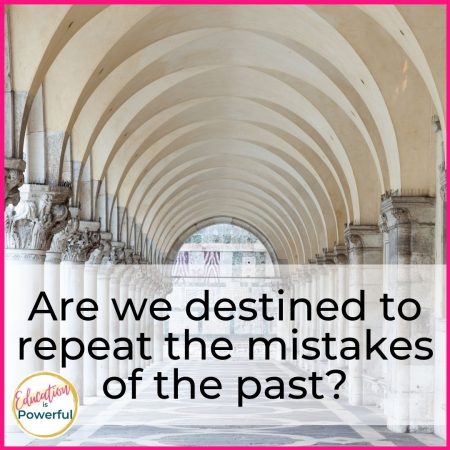
I taught Night by Elie Wiesel every year that I taught 10th grade English. Students thought that it was a one time event. They didn’t realize the atrocities that are still being enacted to this day. As traumatizing as it might have been to read about the Holocaust, I believe my students were more upset learning about holocausts that are happening in the world today. Somehow it feels safer when it happens in the past.
Why do we do this? Why do we fear the loss of power and lash out at others? After reading the Greek Creation myth, the Greeks clearly believed that war was one way to consolidate power. Fathers turning against sons. Mothers inciting violence.
On a more personal level, we can change our own mistakes and our own paths. We don’t have to repeat the mistakes of previous generations.
We can make a difference – even if it feels like it is at a very small level.
